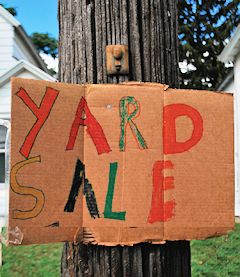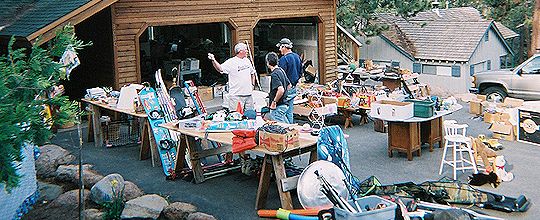We’ve made the decision. We’re leaving the cold Northeastern winters behind, and in just a few weeks my husband and I will be moving south. We’ve sold our home in Upstate NY. We’ve purchased a home in Florida. We’ve planned the details for the actual move itself…
The continuing challenge is one that will sound familiar to many of you. We have way too much stuff!
We were newlyweds when we moved into our current home in 2007. We jammed two entire households worth of stuff into this home – most of it was simply moved to the basement. Then parents passed away and we collected even more stuff. Over the years our kids have removed their stuff, we’ve sold a few things, we’ve given a lot away… From holiday decorations, tools, and hobby supplies to old tax records, books, grandkids’ toys, games, and luggage. Family, sentimental, nostalgic, even historical, plus broken or duplicate stuff. It’s the stuff accumulated throughout two lifetimes and those of our loved ones and… it’s all overwhelming, really.
The conundrum: in Florida there are no basements!
The solution? A yard sale, of course. So Saturday’s sale was the first of two planned….
Throughout the day I haggled, chatted, rearranged and sold stuff. But I also spent time just observing shoppers, and by the end of the day, I had put together a list of relevant customer service lessons for private, professional patient advocates.
Granted, there are some major differences between yard sale shoppers and patients who need advocates. But I hope you’ll be able to use this list to improve how you conduct business with the general public – most of whom will need to hire a private advocate sometime in the future.
Here are the customer service lessons that may be helpful to you:
1. Be prepared. We spent weeks moving thousands of items into the garage. But moving them was just the start. We had to display them in some way – on shelves and tables, or even just on the driveway. Then we had to price them all too – and there were hundreds we missed. At the 11th hour Friday we realized we had no change…. Despite weeks of work, we just were not well enough prepared.
In “real” business, we need to be buttoned up and prepared – missing no details. A yard sale is gone the next day so – no big deal. But your practice can only grow, or be sustained, by being prepared 100% at all times.
2. Know your pricing and its rationale. Our yard sale goal was to clean out, not clean up. We did well, but we priced things way too low and gave much of it away because we just don’t want to deal with it anymore, and of course, because we will no longer have the space to store it. But hundreds of items were priced on the fly, or someone would say, “I’ll give you $5” when the stuff she was holding was probably worth more like $50. A whole lotta haggling happened…
As professional advocates, we need to do just the opposite. We can’t let pricing be loosey-goosey; pricing needs justification. Clients need to understand its value. Further we need to keep our pricing HIGH because that’s why people hire us while at the same time they believe they’ve gotten a bargain.
3. Be flexible. Prepare to adjust as you go along. I’ve always believed that flexibility is the key to a long and happy life, and nowhere is that truer than in business. Whether we’re talking yard sale, or private advocacy practice, if you anticipate surprises, you’ll be prepared to change directions on a dime if necessary. Here’s a yard sale example we were unprepared for: people who wanted to buy NOT the items on the shelves – they wanted to buy the shelves. Yard sale example we WERE prepared for: negotiating prices. That’s a yard sale expectation – and we stayed flexible.
Your clients will ask you to do things you never thought about doing (who will feed the dog while Mrs. Jones is hospitalized?) – or will decide they don’t want you to handle something that is your core skill set (Mrs. Jones really does not want to participate in a clinical trial.)
Flexibility will help you deal with surprises and in the long run, will create great satisfaction once you’ve completed your work.
 4. Be vigilant and prepared to defend yourself. We observed and reacted to shoppers who did some questionable things. One customer began walking to her car with an old wheeled desk chair she had not paid for. Another picked up an old 13×9 cake pan my husband had put some old tools into (with one price tag on the whole thing), then added a few more expensive tools to the cake pan. When he was ready to pay us, he claimed they had all been in the pan. Another pulled the $5 price tag off one item, and replaced it with a $1 price sticker he had pulled off another.
4. Be vigilant and prepared to defend yourself. We observed and reacted to shoppers who did some questionable things. One customer began walking to her car with an old wheeled desk chair she had not paid for. Another picked up an old 13×9 cake pan my husband had put some old tools into (with one price tag on the whole thing), then added a few more expensive tools to the cake pan. When he was ready to pay us, he claimed they had all been in the pan. Another pulled the $5 price tag off one item, and replaced it with a $1 price sticker he had pulled off another.
We must be vigilant and protective of our practices, too. We need to keep our insurance up-to-date. We need signatures on contracts. We must adjust to scope-creep. We need to be sure we use disclaimers, and at all times we need to manage client expectations. Those are defensive measures for smart business people.
5. Don’t assume you know what people want. Yard sales prove the point that “one man’s trash is another man’s treasure.” I spent much of the day in disbelief over what some people wanted to buy, and how much they were willing to pay.
For patient advocacy, the phrase might be interpreted a bit differently, but with far more impact. For example, the medical system likes to assume that people want to live longer (because they can make more money as long as someone continues to live) – but sometimes the suffering patient doesn’t feel the same way. Or an advocate may be asked by an adult child to share more about Mom’s treatment – but the client (Mom) doesn’t want her kids to know what’s going on. I also found there was often a difference in behavior among people who “wanted” items – vs – people who “needed” items. They approached their yard sale shopping differently.
We advocates need to be clear about expectations and wishes through our client’s lens, not our own. Repeat your interpretation to clients to be sure you are on the same page. If caregivers are involved, be sure you all (patient, caregiver, advocate) have the same expectations to prevent problems later.
6. Further to point #5: Recognize that not everyone agrees on what is valuable. I have my great-grandma’s old fine china. It’s antique, it’s classic, it’s beautiful, but… I have never used it. I have no use for it. There are 75 pieces of it, it takes up so much room… Do I keep it? Do I give it away? (No – my sisters, daughters, nieces and nephews don’t want it.) Further, fine china elicits no interest from dealers or even online. No one uses it anymore. No one wants it. But it was Great Grammas! So – now what do I do with it?
The same is true for advocacy clients. Don’t assume that just because you offer hospital bedside services, they will want to pay you to provide them. Don’t think that just because you took it upon yourself to arrange for a second opinion, your client will be interested. Be sure you and your client are in agreement on what services you will offer and the services they value and are willing to pay for.
7. Add value. Throughout the day there were little children accompanying a parent or grandparent. The olders would be looking for tools or household goods, and the kids would grab a box of crayons — so if Mom or Granddad was paying for their new treasures, I would just say “no charge!” for the crayons or other small toy… Lots of good will, some conversation… If I ever go into the yard sale business permanently, I will already have built some good word-of-mouth.
As advocates, there are many services we might offer as value-adds. NOT for free – but at a reduced price because you have already been paid for other services. This creates more value for the client and eventually more income for you. Offer to work through a conversation about advance directives, or enlist another advocate who can do medication reviews to do them inexpensively for all your clients at reduced pricing, or be the person who monitors the patient’s electronic health records, or…. You’ll find appreciation, great word-of-mouth marketing, and more business by providing these value-add services.
8. Say thank you. No explanation needed.

We did quite well with our sale. But there are still hundreds of items left, so we’re going to do it again in a few weeks, just prior to our move.
We’ve learned our lessons. We’ll be better prepared next go-round. We’ll try to get more items priced. We won’t put wheeled chairs at the end of the driveway. We’ll have quarters and dollar bills at the ready. And we’ll throw lots of extra things into those plastic grocery bags we’ve been saving for just these occasions.
I hope this blog post spur you into nailing down your customer service business practices. They will help you maximize your effectiveness and increase your opportunities.
And I hope you aren’t grappling with your great gramma’s fine china.
LEARN ABOUT APHA MEMBERSHIP | FIND MORE REASONS PATIENTS NEED ADVOCATES?






Points all noted and all well taken. You are brave–yard sales are a bear!
I loved your blog, Trisha.
Good luck with the move!!
Rae